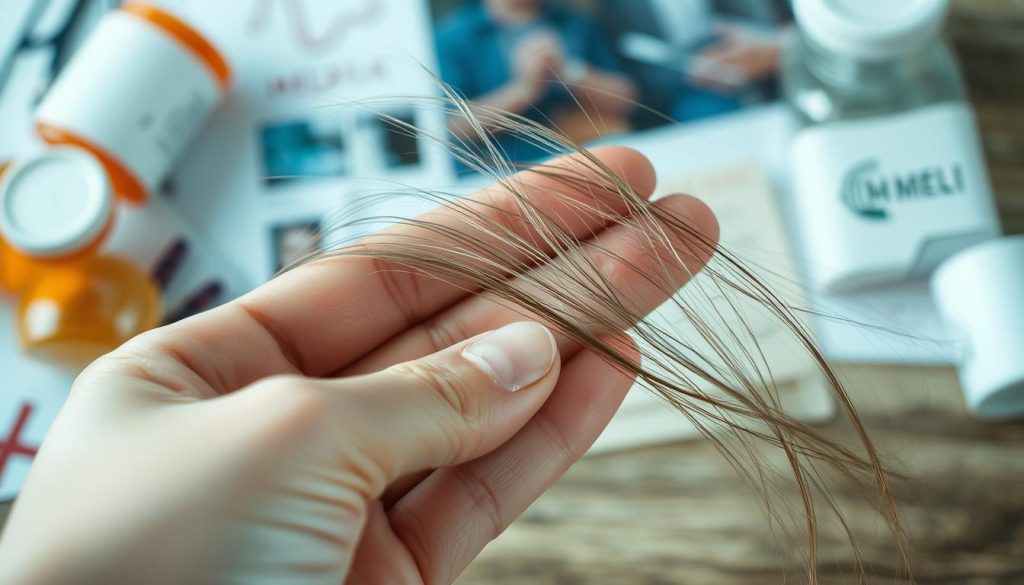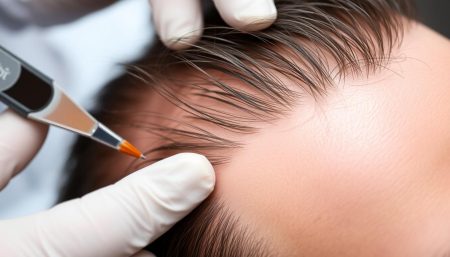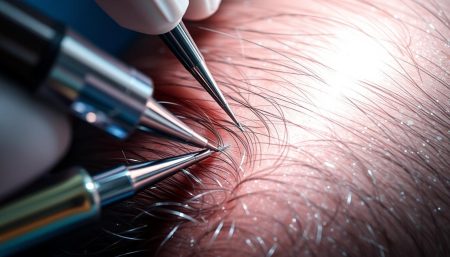Metformin is a common drug for type 2 diabetes. But, it raises questions about side effects, including metformin and hair loss. This is a big worry for many people. We will look into if does metformin cause hair loss and how to handle it.
Metformin has been a key treatment for diabetes for years. We’re still learning about its effects. Our goal is to give you reliable info to help you make smart choices about your treatment.
Key Takeaways
- Metformin is widely used for type 2 diabetes but raises concerns about hair loss.
- We’ll examine the link between metformin and hair loss to give you a clear view.
- Both personal stories and research will help answer the question: does metformin cause hair loss?
- We’ll talk about ways to prevent and treat hair loss from metformin.
- Knowing early signs and expert advice can help those dealing with this issue.
- Our goal is to help you make informed choices with practical advice.
Introduction to Metformin and Its Uses
Metformin is well-known in medicine for helping manage Type 2 diabetes. It’s also being studied for its benefits in other health areas. This section will look at the different ways metformin medication is used and its key role in diabetes care.
Understanding Metformin as a Medication
Metformin makes your body better at using insulin. This helps your body take in more glucose and makes less sugar in your liver. Doctors often start with metformin because it works well and has few side effects.
This medicine is crucial for many people. It keeps blood sugar levels stable and helps avoid problems from high blood sugar.
Common Conditions Treated with Metformin
Metformin is mainly for diabetes, but its uses have grown. It’s also used for:
- Polycystic ovary syndrome (PCOS), to help with menstrual cycles and insulin levels.
- Pre-diabetes, to prevent Type 2 diabetes in those at high risk.
Research is also looking into metformin’s effects on aging and cancer. This shows its wide range of uses in medicine.
Exploring the Link Between Metformin and Hair Loss
Metformin is a key drug for diabetes management. It has been studied a lot for its effects and side effects. There’s a growing concern about metformin and hair loss. We’ll look at personal stories and scientific studies to understand this better.
Personal Anecdotes and Clinical Observations
Many people taking metformin have noticed their hair thinning or falling out. This has led to questions about the drug’s role in hair loss. These stories, though not scientifically proven, hint at a possible link. They highlight the need for healthcare providers to explore metformin side effects hair loss further.
What the Research Says About Metformin and Hair Loss
Despite personal accounts, research doesn’t strongly link metformin to hair loss. Studies on metformin hair loss treatment show that hair thinning rates are similar to the general population. This suggests other factors might be causing hair loss.

The gap between personal experiences and research findings is intriguing. It shows the need for more research on metformin’s effect on hair. Knowing how metformin impacts hair health is important for patients’ well-being. So, more studies are needed to see if special treatments or precautions are necessary for metformin users.
| Source | Anecdotal Evidence | Research Findings |
|---|---|---|
| Patient Forums | Reports of increased hair shedding | Not statistically significant |
| Clinical Studies | Minor complaints about hair thinning | No direct correlation with metformin |
| Expert Opinion | Varied observations | Need for further research |
Does Metformin Cause Hair Loss?
Many people wonder if metformin can cause hair loss. This concern has sparked debates among users and researchers. They ask if metformin hair loss reversible is something that can be managed or reversed. We will look into this topic to give you a better understanding.
First, it’s key to note that not everyone on metformin experiences hair loss. Several factors, like health conditions, lifestyle, and genetics, affect this. These factors can make hair loss more likely for some.
| Factor | Impact on Hair Loss | Relation to Metformin |
|---|---|---|
| Genetic predisposition | Higher susceptibility to hair loss | May exacerbate an underlying condition |
| Diabetes | Diabetes itself can lead to hair thinning | Metformin is a treatment for diabetes |
| Nutritional deficiencies | Can cause hair loss | Metformin might affect nutrient absorption |
Considering these factors, it’s clear that metformin’s impact on hair loss depends on the individual’s health. While metformin hair loss reversible is a worry, it’s often linked to managing diabetes. Diabetes itself can affect hair health.
Despite the complexities, some people find that hair loss from metformin is reversible. Changing the dosage or treatment plan might help. This shows the need for personalized advice from doctors.
The question of whether metformin causes hair loss is complex. It depends on each person’s health and how the drug helps with diabetes. More research and trials are needed to fully understand metformin’s effects and how to manage hair loss.
Investigating How Metformin Interacts With Hair Follicles
To understand how metformin affects hair growth, we need to look at hair follicle biology. This drug is mainly for managing blood sugar in type 2 diabetes. Yet, some people say it causes thinning hair. We’ll explore why metformin might affect hair health.

Metformin might change how the body works, including hair growth. We’ll examine the hair growth phases—Anagen, Catagen, and Telogen—to see how metformin could disrupt them.
| Hair Growth Phase | Characteristics | Potential Impact of Metformin |
|---|---|---|
| Anagen (Growth Phase) | Active growth of hair cells; can last several years. | Metformin may shorten this phase, leading to premature entry into the next phase. |
| Catagen (Transition Phase) | Lasts around 2 weeks; hair follicles shrink and growth slows. | Increased metabolic stress from metformin might hasten this phase. |
| Telogen (Resting Phase) | Hair growth halts and old hair prepares to fall out. | Metformin could prolong this phase, increasing hair shedding and thinning. |
Even though there’s no clear proof that metformin and thinning hair are linked, knowing how it affects the body helps guess its impact on hair follicles.
Metformin Side Effects: Hair Loss as a Concern
Metformin is often used to manage type 2 diabetes and other health issues. However, there’s growing concern about metformin side effects hair loss. It’s important for those taking it to know about these side effects and how to prevent metformin hair loss.
Potential Mechanisms Behind Hair Loss
Studies show that metformin might affect hair loss by impacting vitamin B12 absorption. A lack of vitamin B12 can harm hair health, leading to thinning and loss. Metformin may also disrupt hormonal balance, which can cause hair loss too.
Risks and Predispositions for Experiencing Hair Loss on Metformin
People with hormonal or nutritional issues might see more hair loss on metformin. Age, genetics, and existing nutritional deficiencies can make this side effect worse. It’s key to watch out for these risks. For help managing these risks, talk to healthcare providers who can suggest personalized solutions to prevent hair loss.
If you’re on metformin and worried about hair loss, talk to your doctor. They might suggest checking your vitamin levels or adjusting your dosage to help prevent hair loss.
Addressing Metformin Hair Loss Prevention
If you’re taking metformin, knowing how to avoid hair loss is key. Making lifestyle changes and adding certain foods to your diet can help. Here’s how to keep your hair healthy while on metformin.
Lifestyle Factors to Consider
- Exercise Regularly: Regular workouts help balance hormones and improve blood flow. This can make your hair follicles healthier.
- Stress Management: Too much stress can lead to hair loss. Try meditation, yoga, or counseling to manage stress.
- Sleep Well: Adequate sleep is vital for your body’s repair. Lack of sleep can disrupt hormones and worsen hair loss.

Dietary Changes and Supplements
Your diet affects your body, including your hair. Here are some foods and supplements that can help prevent hair loss while on metformin:
| Nutrient | Benefits | Sources |
|---|---|---|
| Vitamin B12 | Supports hair follicle health and helps in red blood cell production | Meat, eggs, dairy products, fortified cereals |
| Iron | Crucial for hair growth and repair | Red meat, spinach, lentils, pumpkin seeds |
| Zinc | Helps in tissue growth and repair | Oysters, beef, spinach, pumpkin seeds |
| Omega-3 Fatty Acids | Enhances scalp health and hair density | Fish oil, flax seeds, walnuts |
Eating these foods can help with metformin hair loss treatment. It also boosts your overall health. This is a great way to prevent hair loss from metformin.
Methodologies for Metformin Hair Loss Treatment
Looking into metformin hair loss treatment shows many ways to help hair grow back. These methods include medical treatments and natural options. Each one has its own benefits, depending on what you need and your situation. Here’s a look at the top treatments available.
- Topical Minoxidil: This is a top pick for both men and women. It makes blood vessels in the scalp wider, helping hair grow.
- Oral Supplements: Taking biotin, zinc, and iron can help your hair grow back. This is especially true if you’re losing hair because of a lack of these nutrients.
- PRP Therapy: PRP therapy uses your own platelets to help hair follicles grow. It’s a way to get your hair to grow again.
- Low-Level Laser Therapy (LLLT): This therapy uses light lasers to help hair follicles. It reduces inflammation and helps your hair grow back.
If you want to know how these treatments compare, check out the table below. It shows key details about each method.
| Treatment | Effectiveness | Duration | Cost |
|---|---|---|---|
| Topical Minoxidil | Highly effective, visible results | 4-6 months | Low |
| Oral Supplements | Varies, dependent on deficiency | Ongoing | Medium |
| PRP Therapy | Highly effective | 1 year (monthly sessions) | High |
| Low-Level Laser Therapy | Effective with continuous use | Ongoing | High |
With so many options for metformin hair loss treatment, you can find a solution that works for you. It doesn’t matter if you’re on a budget or have a busy schedule. With the right treatment, you can see your hair grow back.
Is Metformin Hair Loss Reversible?
When we talk about metformin hair loss reversible and metformin hair loss regrowth, it’s key to know the difference between short-term and long-term effects. Recent studies show that metformin can lead to hair loss, but this is often temporary. It can get better once the medication is adjusted or the underlying issue is treated.
Short-Term Versus Long-Term Hair Loss Scenarios
Knowing how long hair loss lasts for metformin users helps us understand this side effect. Short-term hair loss happens in the first few months of treatment. It might even go away without stopping the medication. But, long-term hair loss could mean a bigger problem that needs attention.
Success Stories: Recovery and Regrowth After Metformin
Many people have seen metformin hair loss regrowth after changing their treatment or stopping metformin. Their stories give hope to those facing the same problem.
| Duration on Metformin | Extent of Hair Loss | Hair Regrowth After Adjustment |
|---|---|---|
| 3 Months | Mild Thinning | Complete within 6 months |
| 1 Year | Significant Loss | Partial within 1 year |
| Over 2 Years | Severe Loss | Gradual, post-discontinuation |
If you’re losing hair while on metformin, talking to your doctor is important. They can help figure out if your hair loss is reversible. If not, you can look into other options or treatments to help your hair grow back.
Understanding Metformin Hair Loss Regrowth Possibilities
Many people are looking for ways to stop hair loss caused by metformin. They want to grow back healthy, strong hair. This section looks at different methods that might help prevent more hair loss and encourage new hair growth.
Strategies to Stimulate Hair Regrowth
Trying different treatments and making lifestyle changes can help grow back hair. Important steps include:
- Topical treatments like minoxidil, known for helping hair grow back.
- Eating foods rich in vitamins and minerals, like Vitamin B12, Iron, and Zinc, for hair health.
- Reducing stress through yoga, meditation, or exercise to protect hair health.
For more information on metformin and hair loss, check out this resource. It has detailed information and more tips.
The Role of Hair Care and Maintenance
Keeping a good hair care routine is key to preventing damage and helping hair grow back. Avoid using hot styling tools and limit chemical treatments. Also, use mild shampoos and conditioners made for thinning hair to nourish and strengthen hair follicles.
| Regrowth Strategy | Key Benefit |
|---|---|
| Topical Minoxidil | Promotes active hair growth |
| Improved Diet | Provides essential nutrients for hair follicles |
| Stress Management | Reduces hair shedding induced by stress |
| Gentle Hair Care | Prevents further hair damage and breakage |
Stopping hair loss and growing new hair might seem hard, but it’s doable. By using a mix of treatments and lifestyle changes, you can improve your hair health. These efforts are important for getting your hair back to its healthy state.
Metformin and Thinning Hair: Identifying the Early Signs
It’s important to know how metformin and thinning hair are connected. Thinning hair can be upsetting. But, spotting early signs of metformin side effects hair loss can help manage it better.
Recognizing Hair Thinning and Loss
Spotting small changes in your hair volume is key. More hair shedding, a visible scalp, or changes in hair texture might be due to metformin. Watching for these signs can help figure out if metformin is the cause.
- Increased hair shedding
- More visible scalp areas
- Changes in hair texture and thickness
When to Seek Medical Advice Regarding Hair Issues
If you see signs of hair thinning and think it might be from metformin side effects hair loss, see a doctor. They can check you, suggest treatments, or change your medication to help with hair loss.
- Schedule regular appointments for hair and scalp assessment.
- Discuss possible alternatives or adjustments in your metformin prescription.
- Explore supplementary treatment options to address hair health.

Comparing Metformin With Other Medications and Hair Loss
Looking at metformin and hair loss, it’s key to see how it compares to other drugs that can cause hair loss. Unlike some drugs that can stop hair growth, metformin side effects hair loss is not as common or well-studied.
Metformin is mainly used to help control diabetes by making the body more sensitive to insulin. Other drugs might cause hair thinning or loss in different ways. For instance, some chemotherapy drugs harm all fast-growing cells, including those in hair follicles, leading to more hair loss.
| Medication | Type of Medication | Common Hair Loss Impact | Biological Mechanism |
|---|---|---|---|
| Metformin | Diabetes management | Mild to Moderate | Indirect impact on nutrient absorption and hormonal regulation |
| Warfarin | Anticoagulant | Moderate | Interference with keratin production and blood supply to hair follicles |
| Cyclophosphamide | Chemotherapy | Severe | Rapid cell death including hair follicle cells |
| Lisinopril | ACE Inhibitor | Mild | Hormonal changes affecting hair growth cycle |
Knowing the differences between metformin and hair loss and other drugs can help ease worries for those taking this medication. While metformin side effects hair loss might worry some, it’s usually not as bad and can be managed with diet and doctor advice. Each drug has its own side effects, and hair loss can often be lessened with the right care.
Expert Opinions on Metformin and Hair Loss
Experts share important views on how metformin affects hair health. They talk about metformin and hair loss, and how to prevent it.
What Healthcare Professionals Say
Healthcare experts say we need a full plan to deal with metformin’s side effects. They point out that metformin might cause hair loss, but it’s not a sure thing. Things like how much you take, your health, and other medicines you’re on matter a lot.
They suggest keeping a close eye on patients and changing treatments if needed. This helps protect hair health.

Debunking Myths and Misinformation
There are many wrong ideas about metformin and hair loss. One big myth is that metformin makes everyone lose a lot of hair. But experts say this doesn’t happen to everyone, and it’s often tied to other health issues or not getting enough nutrients.
They stress the importance of clear talk and teaching patients the truth. This helps sort out what’s real and what’s not about preventing hair loss from metformin.
| Common Myths | Expert Clarifications |
|---|---|
| Metformin causes hair loss in all users | This side effect is not universal and varies by individual circumstances |
| Hair loss from metformin is permanent | Most cases are reversible with proper treatment and care |
| Stopping metformin immediately resolves hair loss | Gradual dosage adjustment and holistic treatment approaches are recommended |
As research goes on, talking about metformin hair loss between patients and doctors is key. Experts push for a fair understanding and taking steps to manage side effects. This helps keep both your health and hair in good shape.
Real-Life Experiences: Metformin Users Sharing Their Stories
Looking into the personal stories of those on metformin helps us understand its effects on hair. These tales show how people deal with metformin hair loss regrowth. They offer real-life examples of how theory works in practice.
The Impact of Hair Loss on Quality of Life
Hair loss from metformin has deeply affected many. It’s not just about losing hair; it’s also about feeling sad and anxious. This shows how medication can affect more than just our bodies, touching our minds and feelings too.
Coping Strategies and Community Support
People facing hair loss from metformin have found ways to cope. They change their diet, reduce stress, and use special hair care. They also find comfort in support groups.
In these groups, people share tips and experiences. They help each other learn how to make hair grow back. This support is very helpful.
- Adapting nutritional intake to support hair health
- Engaging in regular physical activity to decrease stress levels
- Exploring hair care formulas that fortify hair growth
These groups offer more than advice. They give people a sense of belonging and help them feel better. They show that they are not alone in their struggles with hair loss from metformin.
Conclusion
We’ve looked into how metformin, a common diabetes drug, can affect hair health. We’ve asked if does metformin cause hair loss and shared personal experiences. We’ve also checked out the scientific studies on this topic.
Metformin is key for controlling blood sugar, but it can also harm hair follicles. This is a side effect that can’t be ignored. Our research shows that metformin’s benefits and hair loss issues are both important to talk about.
We need more studies to figure out why metformin might cause hair loss. We also need to know how to prevent it. It’s vital to watch for hair loss signs and talk to doctors if you notice any.
Our final message is to stay alert for hair loss symptoms while taking metformin. Being involved in discussions and research is important. This article aims to inform you about the link between metformin and hair loss. It encourages you to make smart health choices.
FAQ
Does metformin cause hair loss?
Some people say metformin makes their hair thinner or fall out. But studies don’t prove this link. It might depend on how you react to the drug or your health.
Can metformin side effects include hair loss?
Hair loss isn’t a common side effect of metformin. Yet, some folks might notice their hair thinning. This could be due to not getting enough nutrients or other side effects like stomach problems.
Is hair loss from metformin reversible?
If metformin causes hair loss, stopping the drug might help. Or, you might need treatment. Always talk to a doctor about your hair loss.
What are the treatment options for metformin hair loss?
You can fix nutritional gaps and maybe change your diabetes meds. Stress management and special hair care, like minoxidil, might also help.
Can dietary changes and supplements help prevent hair loss while taking metformin?
Yes, eating well and taking vitamins like D and B12 can prevent hair loss. But, always check with your doctor before starting new supplements.
How can I tell if metformin is affecting my hair health?
Watch for more hair falling out, a receding hairline, or thinning spots. If you see big changes, talk to your doctor to see if the drug is the cause.
What do healthcare professionals say about metformin and hair loss?
Doctors say hair loss from metformin is rare but possible. They suggest watching for side effects and talking openly with your doctor.
Is it important to seek medical advice if I experience hair loss on metformin?
Yes, it’s crucial to get medical advice. This helps rule out other hair loss causes and ensures your health is well-managed.
Are there any success stories of hair regrowth after metformin hair loss?
Yes, some people have regrown their hair after addressing the reasons for their loss. This could mean stopping the drug, changing their diet, or treating nutrient deficiencies.
How does metformin interact with hair follicles?
There’s not much research on metformin’s direct effect on hair follicles. It’s thought that its impact on hormones and nutrient absorption might affect hair growth. But, more studies are needed to understand this fully.
Can improving my hair care routine help with metformin hair loss?
Yes, good hair care can help keep your hair healthy. Gentle handling, avoiding harsh chemicals, and using scalp-friendly products can improve hair quality and reduce loss.
What lifestyle factors should I consider to prevent hair loss while taking metformin?
Eating well, managing stress, getting enough sleep, and staying hydrated are key. A healthy lifestyle can help counteract medication side effects.

















